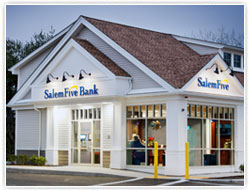After multiple consent orders and management changes since 2013, Lowell-based Sage Bank is no more.
The parent company of Salem Five, a mutual holding company, announced this morning that it would acquire the small, struggling cooperative stock bank for an undisclosed amount. With Sage Bank’s $140 million plus in assets and two retail branch locations, Salem Five will have total assets of close to $4.9 billion and 36 branches.
“Sage Bank, like Salem Five, has a longstanding commitment to its customers. We look forward to serving the families, businesses and communities that Sage Bank has supported throughout its history with excellent service, community-minded professionals and banking technology that we bring to all of our markets,” Ping Yin Chai, Salem Five president and CEO, said in a statement. “The acquisition will allow us to better serve customers in northern Middlesex County, while also adding offices and team members to our strong mortgage division. We are pleased to be in Lowell and the surrounding communities that complement our existing footprint.”
The acquisition comes after Salem Five completed its purchase of Georgetown Bank in 2017, adding to its footprint in the Essex County and expanding into Southern New Hampshire.
“In becoming a part of Salem Five, Sage Bank will be able to offer our customers a broader array of products and services to support their banking needs,” Diane Walker, president of Sage Bank, said in a statement. “Some of our customers will appreciate the expanded network of branch locations where they do their banking; others will take advantage of Salem Five’s insurance and investment offerings. This is an excellent affiliation of two institutions with deep roots in our representative communities.”
The acquisition ends what has been an uphill battle for Sage Bank.
In December 2016, federal and state regulators hit the bank with its second consent order in three years, directing Sage to improve its management and capital levels, as well as develop a new profit and budget plan.
In 2015, the bank agreed to pay roughly $1.2 million to the Justice Department for allegedly charging African American and Hispanic borrowers higher prices for home loans than Sage Bank charged to similarly situated white borrowers for reasons unrelated to their creditworthiness.
In the last five years, Sage Bank has only turned a profit once, in 2016, according to the FDIC. Total assets have declined from about $215 million in 2013 to about $143 million at the end of 2017.
The boards of each bank have unanimously approved the transaction, which is subject to stockholder and regulatory approval.






